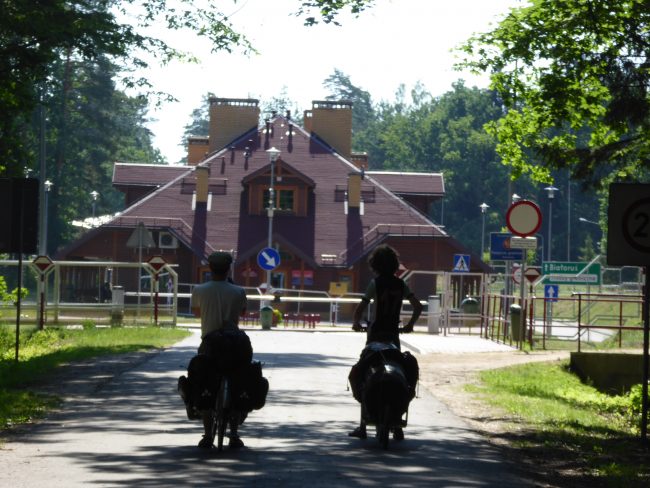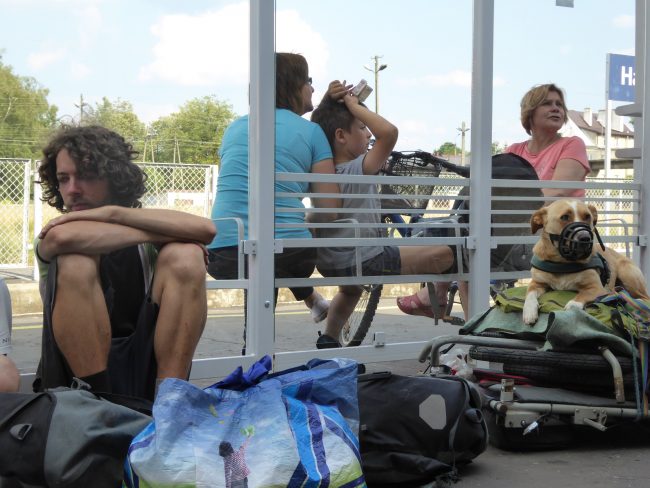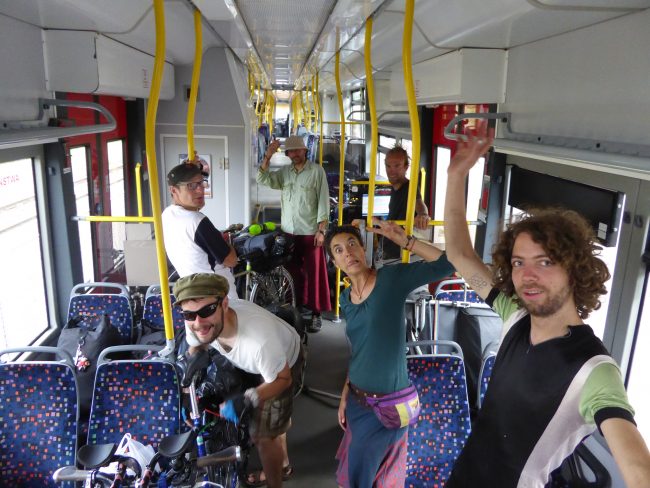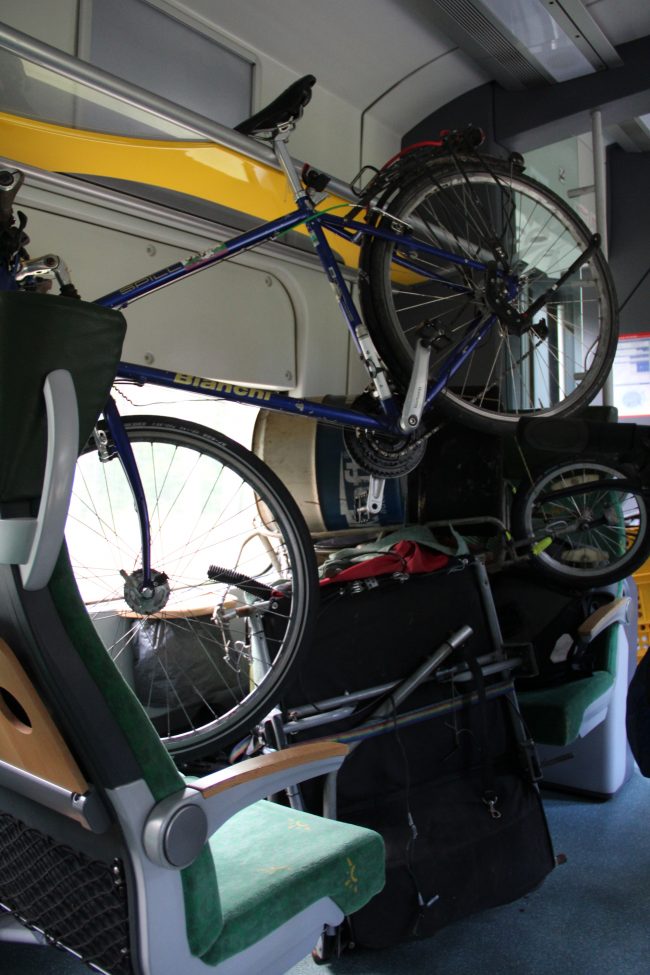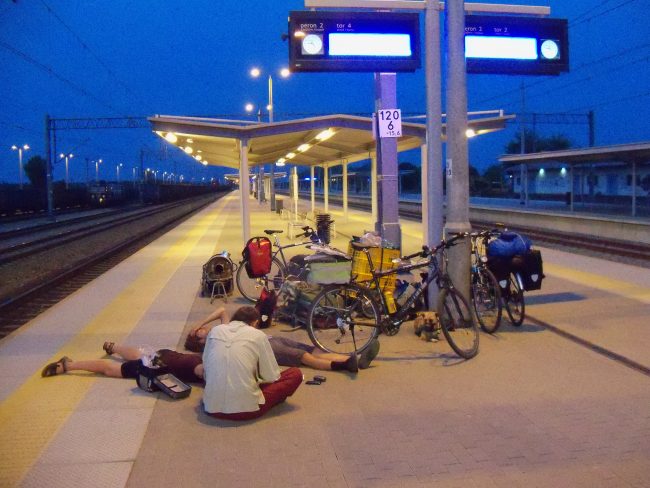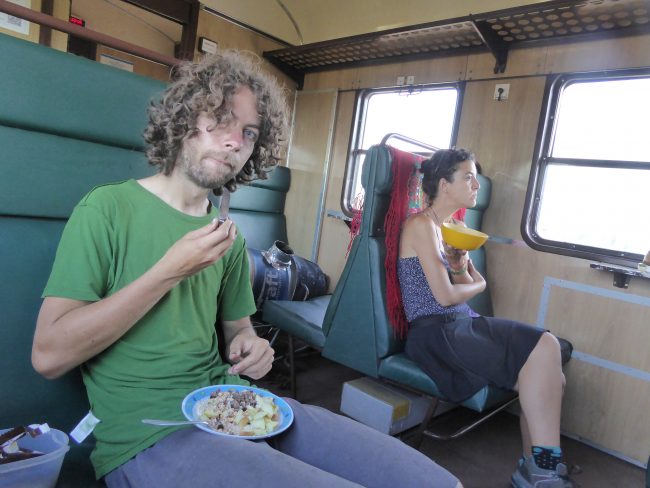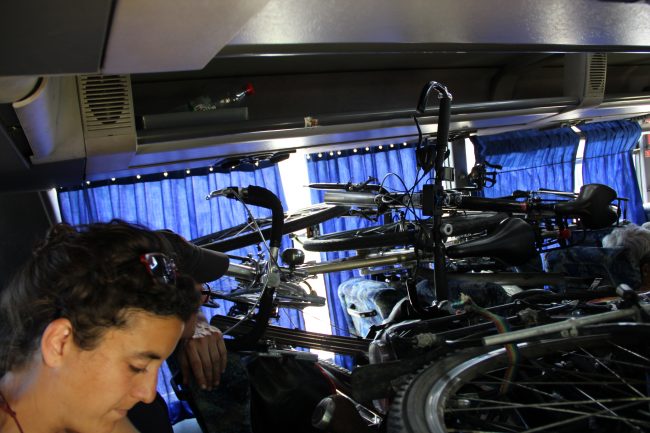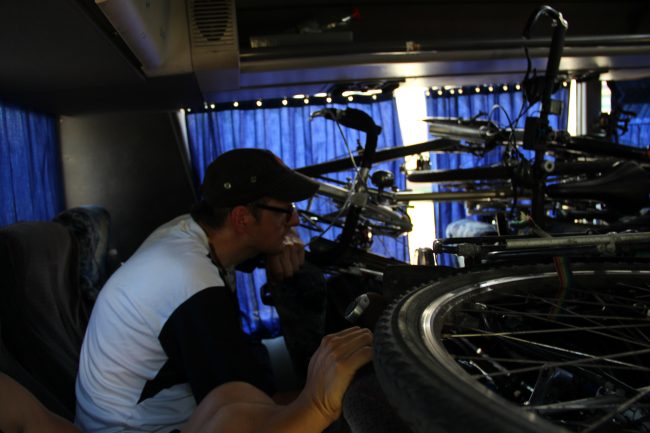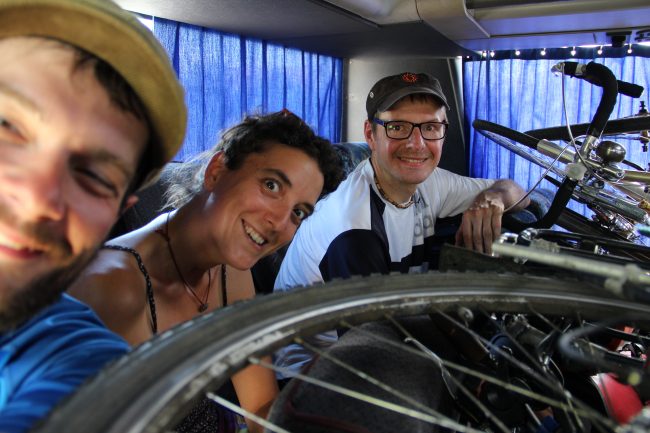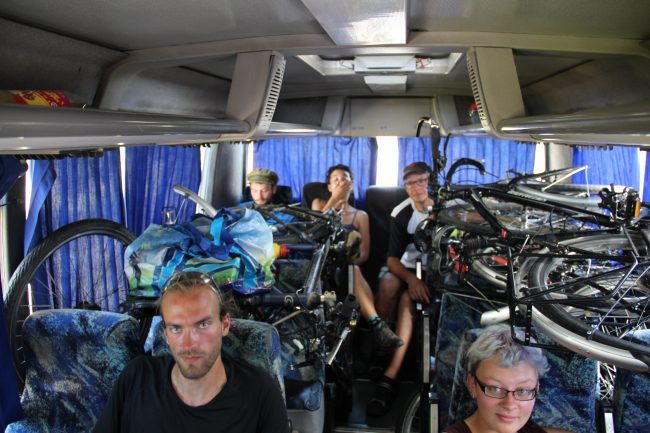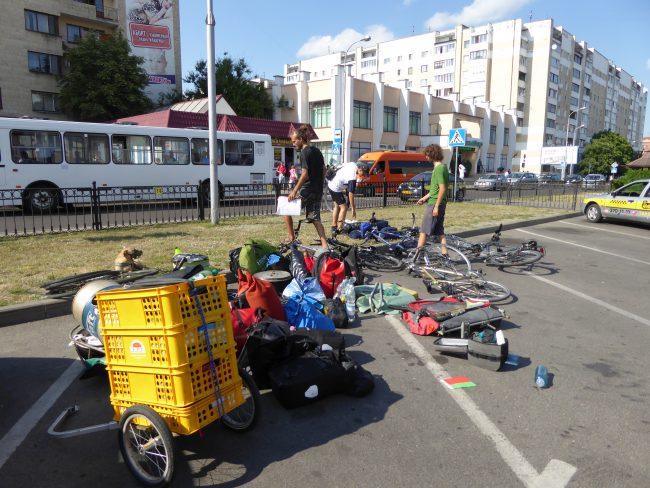When the 2016 biketour collective first discussed going to Belarus, we expected that the visa would require some work, but after doing considerable research into the process, decided it was a manageable task. We did some preparation, but then expected that everything would fall into place when we met together at the starting point in Warsaw and would proceed as planned.
It didn’t.
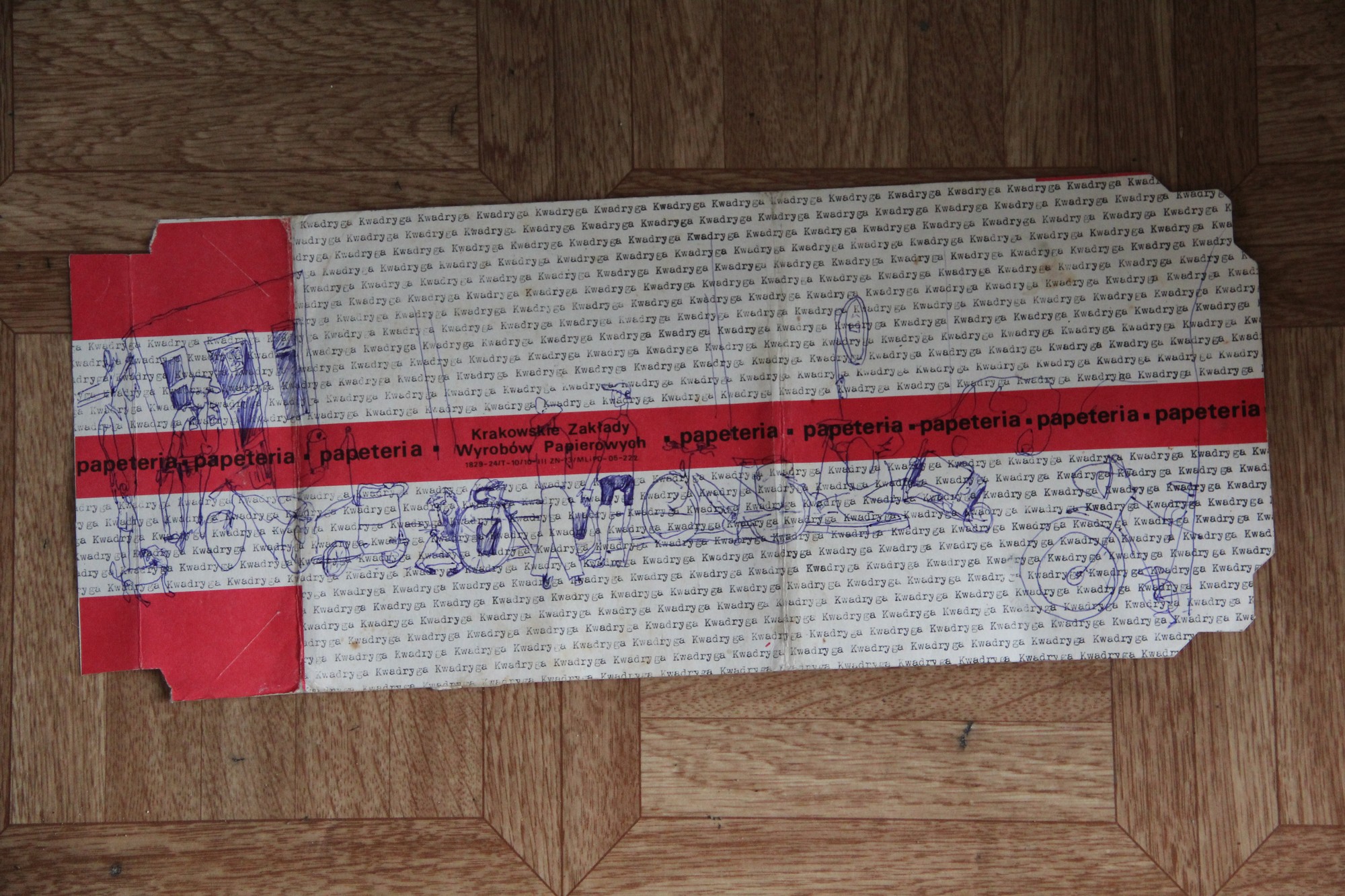
Waiting on the polish side of the border, second try.
So, heres a list of all the ways in which we almost failed to get to Belarus (a blog post about how we actually made it into Belarus to follow…)
1 — firstly, we needed an invitation letter from an organisation — it turned out that the organisation we were in contact with in Minsk couldn’t invite us, as the police would check whether the person inviting us would have a big enough flat to host all of us
2 — We only went to the embassy in Warsaw for the first time 3 days after we were meant to because we didn’t all turn up in Warsaw on the first day as planned
3 — the embassy wouldn’t let us submit our visa forms because an itenary of our stay in Belarus was missing
4 — We re-filled out all the forms until 4am, only to notice one of the participants was actually missing from the invitation letter!
5 — we called the embassy to discuss what was happening and found out the itenary had not arrived
6 — embassy rejected our forms again, this time saying that we cannot get a visa for longer that 10 days (we were asking for 24) because we didn’t use an official travel agency
7 — embassy says that the organisation that gave us an invitation letter are not actually allowed to invite us
all these processes took so long that some of the group started cycling east, leaving one person behind to battle belarusian bureaucracy. but after reaching so many dead ends, we finally admitted defeat with the Warsaw embassy, and re-united the group and continued cycling towards Hajnówka.
We then decided to try calling a travel agency, they quoted us a low price, said they would sort the papers out in just one day. It seemed too good to be true, but with not many other options, we gave it a go. For a while everything seemed to be going smoothly. The agency made the documents correctly, sent them ahead to the Bialystok embassy and emailed us all the necessary papers. We woke up at 4am the next day to travel to the embassy on the bus. We were first in the queue, everything went well, we even picked it up the next day. Although we had already guessed that these situations were more complicated that we had thought, we were just not prepared for the next 48 hours of chaos. We slept in the forest the day we got the visa, 4 km from the border, so we could go to the border crossing early. and then…
8 — Białowieza border crossing will not accept Knödel. in addition to this they apparently do not have the phone numbers of any other of the border crossings or any idea about the dog and bike acceptance situation
plan B — we get trains south to quickly get to another border crossing.
9 — and so begins the challenge to cycle 21km in one and a bit hours back to Hajnówka to the train station to get the only train of the day that connects properly with other trains to get us to the border. We try hard, but of course miss the train by a few minutes
10 — the next train we get, but the one after that breaks down in the middle of nowhere (and nowhere helpful) so we are stuck on a sweaty train. When it moves again it crawls forward at a pace that even we can cycle faster than. consequently we miss our connections and stay overnight in a small town 40km from our destination.
We spent all afternoon making phone calls and searching online about checkpoints.
11- we find out that the most obvious crossing point that accepts dogs and bikes is Domracheva, but through asking a polish speaking person to ask a russian and polish speaking person to call the border crossing hotline , and then translating back again, we find out that the border crossing shuts at 8am the next morning, for 3 months.
We awake at 5am to catch an early train to Terespol and then cycle 5km to varshavski-most (Warsaw Bridge) border crossing
12 — there is a lot of queuing and checking and angry uniformed men but finally we are on the bridge at the first Belarus check point — they reject us because we are not allowed to cross with bicycles. so u-turn on the bridge and then back through the polish checkpoints
13 — we might have been able to make the 3pm train from Terespol to Brest but the border checks took so long when we arrived at the train station they told us we were too late to check onto the train
Instead, we made a bargain with a bus driver , and somehow he was persuaded to let us load 7 bikes, 7 people, 3 trailers, a lot of luggage, and a dog, onto the back of a not-so-big bus.
14 — the border guard interrogates us really suspiciously why on earth we loaded our bikes on a bus instead of just cycling across the border. in the end he completely forgets to check Knödel, and we have to remind him of it (because the border guards in Białowieża Forest told us that we need to get some document that we have to show when we leave Belarus). he gets the vet to look through his papers, and in the end we don’t get any document, so the whole procedure was really unnecessary.
15 — we mess up the new currency (on the day that we enter Belarus, the currency changes to a new one that converts to the old currency by a rate of 1:10000) and think we paid 6 € for a hostel, but we actually pay 60 €. paying for a hostel was necessary, as we need to register in at least one official sleeping place during our stay in Belarus. in the end it turns out that the hostel can not register us, because foreigners are not meant to sleep there.
16 — naïvely, we ask several hotels on the way if they can just give us the registration stamp on our migration cards. they all want to have sums around 70 € per person (to make one stamp). so in the end we can stay one day less than planned in Shanti Dom in order to rush to Minsk to sort out the registration
17 — after so much hassle and finally finding a hotel that stamps us against a comparatively small fee, when leaving Belarus, no one even looks at our migration cards.
- Excitedly reaching the first border to Belarus, only to get checked for hours and then be refused.
- Waiting for the train to take us to another border crossing
- Fitting all the bikes on the train…
- …requires some creativity.
- We missed the last train…
- Breakfast on the train!
- Not much space…
- …on the bus across the border
- Finally arrived in Belarus!






